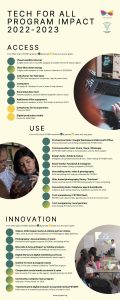Why We Partner
PSYDEH makes a paradigm changing impact in a difficult national funding climate because of outside-the-box thinking around resource raising and strategic alliances. One key resource is corporate partnerships.
A unique example is our largest corporate partnership ever, a transformative relationship with the satellite communications company Viasat headquartered in Carlsbad, California. Viasat is one of the largest companies in the world safely, sustainably and ethically shaping how consumers, businesses, governments, and militaries around the world communicate — bringing connectivity when, where, and how it’s needed most.
Viasat and PSYDEH: A perfect fit
This partnership began when Viasat chose PSYDEH for their inaugural cohort of six nonprofits across the Americas confronting the digital divide. We were selected for three reasons: (1) our women partners demand more connectivity, (2) PSYDEH’s novel programming links digital inclusion with female entrepreneurship and community impact to reduce inequality, and (3) we effectively link local partners and global investors like Viasat.
Reciprocal transformation
Viasat’s team made clear early on that this partnership was going to be unique. Their social impact leaders wanted to make a concrete, sustainable impact by co-creating with PSYDEH, and by contributing their significant connectivity resources to meet local needs.
Where We Focus Efforts
PHASE ONE (QTRs 1-2, 2022): Smart use of Viasat funds, hardware, and services.
Local needs
PSYDEH and Viasat began by ideating around barriers to digital connectivity, including access challenges like poor phone signal and internet, regular power outages, and insufficient hardware. Viasat employees then traveled to PSYDEH’s isolated, mountainous work areas for a week of in-person evaluation while installing Viasat satellite dishes and modems at our new network of six remote digital resource centers (digital centers). When in the country, Viasat also gathered personal stories around the effects of the digital divide to relay back to company leaders in the United States while offering basic training to PSYDEH staff on satellite hardware maintenance.
Sustainability is paramount
Climate change and underdevelopment challenges are complex and interrelated, especially in the Global South; regular power cuts mean that satellite internet solves only one piece of the connectivity problem. Viasat’s answer was to bring in their Canadian partner, Clear Blue Technologies, to integrate solar off-grid energy solutions into our digital center network.
PHASE TWO (QTRs 3-4, 2022): Strengthen solar, satellite and hardware access solutions while using digital tools to innovate.
Power sharing: A shared vision
PSYDEH has learned that a mutually beneficial partnership built on reciprocal sharing gives us the best chance to make a sustained impact. Viasat agrees. For example, Viasat’s social impact goal is to transform how nonprofits and their community partners work by way of a comprehensive investment. Thus, they delivered significant in-kind goods and services, as well as a flexible grant to help fund PSYDEH’s work to maximize impact from their first in-country visit, and to prepare for the partnership’s flagship element: a ten-day digital literacy service project in Mexico with fourteen Viasat professionals working with two experts from USA-based Team4Tech.
For our part, PSYDEH helps Viasat by giving them a comprehensive diagnostic of technology use in rural, marginalized Mexico and a digital center-specific diagnostic. We consulted Viasat’s social impact team on how to build partnerships in rural Latin America. We advised their social impact measurement partner, Impact ROI, on realistic measuring strategies for this kind of work. And we offered feedback to Viasat leaders of their Ambassador Program in Mexico.
Digital Transformation: The shared goal
Viasat’s team of fourteen employees fully transformed how PSYDEH and our local partners navigate the digital divide. We optimized power and wifi solutions. We increased organizational and local partner access to laptops and other digital devices. We enjoyed robust digital literacy training for staff and local women partners, all of which continues to be used in 2023-2024 programming. The full scope of quantitative and qualitative impact are showcased in this infographic.

PHASE THREE (2023-2024): Celebrate, Amplify and Sustain Progress
Our unique transformational partnership is ripe for promotion. We each do this in interesting ways. Viasat promotes our work on their social impact website, in a spring 2023 article and promotional video, as well as in this article, this article, and this article from late-2023. PSYDEH promotes the partnership in our 2022 annual report, as well as this high-level case study and our video ad aimed at national and global technology partners. We also use this 2023 interview for Australian Radio to celebrate Viasat, sharing how we integrate renewable energy and satellite wireless into our community-led development work. We will do more of the same in 2024, including with a detailed case study published in a philanthropy-sector journal, complete with images and forthcoming 2023 impact metrics.
PSYDEH amplifies Viasat impact with ongoing programming to increase digital access, use, and innovation by combining their investments with tech from other company partners and collaborators. For example, in late-2022, we USED renewable energy solutions (strengthened by our partner Honnold Foundation), to POWER Viasat satellite wireless, ACCESSED by forty-two Viasat donated laptops and other devices. This SUPPORTED partner Zoom’s web conferencing AI powered platform and Google collaborator WorkSpace, Slack collaborator’s messaging app, and partner Adobe software and training, we USED to organize a digital inclusion regional forum. Here, 200+ rural and Indigenous women INNOVATED their own declaration (English and Spanish) for Mexican government officials on needed development policies and funding and in-kind support. Some of these needs have already been met and we push to meet more in 2024.
PSYDEH sustains and expands this impact by combining Viasat’s marketing and digital literacy trainings with 2020-2023 learning from partners 3M, HSBC, Johnson & Johnson, and Zoom to help women-led cooperatives. For example, our 2023-2024 digital access/use/innovation training of women leaders includes themes like social media marketing, online banking, digital entrepreneurial skills, and Google Lens to achieve their business goals.
Why it is a Mutually Beneficial Partnership
For Viasat
Social impact investments in PSYDEH show the company’s unique commitment to Mexico, Latin America and the Global South; this is a strong basis for increasing market share.
Our partnership plays a small role in how Viasat builds out and communicates their social and community impact work, including their commitment to transformative collaborations. Indeed, Viasat’s collaboration with PSYDEH has been selected from a field of 2000 entries to receive a 2024 Anthem Award, specifically Bronze recognition in the Diversity, Equity & Inclusion — Education or Literacy Program or Platform category.
The environment into which we plug Viasat’s investment is ready to be formalized and strengthened as a model digital inclusion-making ecosystem in 2024. This will give Viasat and other tech company partners new business opportunities and ways to work with civil society to safely, sustainably and ethically connect the world.
Our collaboration helps Viasat to align social impact with talent recruitment and development, including cross-fertilization between employees in different business segments and offices. It is also a great way for Viasat professionals to practice company values like tolerance of ambiguity, trust, freedom, and opportunity.
Lastly, our partnership helps Viasat staff learn lessons to improve products, services, and customer-centric innovations.
For PSYDEH
Viasat’s investment has completely transformed our operations and the communities where over sixty women partners live.
Their sustained support helps PSYDEH to inch closer to completing a proof-of-concept model by the end of 2024, our clear articulation of how we can empower community-led sustainable development.
Our partnership also showcases grassroots NGO PSYDEH’s success with weaving together mutually beneficial global partnerships. Here, for example, after PSYDEH secured an alliance with GlobalGiving in 2016 they linked us to Bank of America in 2017, Dentsu Inc. in 2018-2019, and HSBC in 2021. Soon after, Viasat found us through GlobalGiving, and partnerships with Adobe, 3M, Dell, and Expedia Group have followed in 2022-2023. Throughout, PSYDEH wins game-changing resources, and these partners achieve strategic goals while winning new resources, too, e.g., we helped Team4Tech to secure a new project from Viasat.
Lastly, Viasat aids PSYDEH in making major advances towards our goal of becoming a sustainable operation with progress around five different, interconnected resource streams. Securing needed financial support and robust in-kind donated goods and professional services helps us to empower women staff. With more PSYDEH support, women partners successfully stand up their cooperative businesses promoting social, economic, and gender equality. Their impact-oriented stories then become the basis for more partnerships with Mexican and global donors. PSYDEH staff and women partners use these fact-based stories and human rights-based digital transformation to develop sustainable income streams by bringing their handmade textiles and artisan goods to national and international markets, including by partnering with luxury brands like ONORA. In turn, this success is the backdrop for women-led power and new development policies, resulting in more resources for marginalized communities in rural Mexico.

